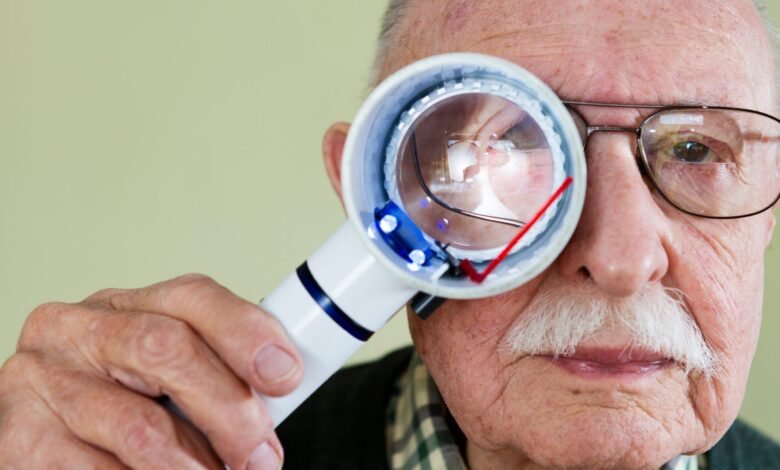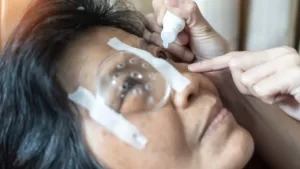What Are The Early Warning Signs of Macular Degeneration?

Macular degeneration is a condition that affects millions of people worldwide, often leading to vision impairment or even blindness. The key to managing this condition effectively lies in early detection. In this article, we will delve into, what are the early warning signs of macular degeneration. Understanding its types and exploring how recognizing these signs can play a pivotal role in preserving your precious eyesight.
What is Macular Degeneration?
Macular degeneration, often called age-related macular degeneration (AMD), is a progressive eye disease that affects the central portion of the retina called the macula. The macula provides sharp, detailed vision, which is crucial for reading, recognizing faces, and driving.
As AMD progresses, it can lead to central vision loss, making everyday activities challenging. While the peripheral vision remains intact, the ability to perceive fine details becomes compromised, impacting the overall quality of life.
Types of Macular Degeneration
There are two main types of macular degeneration: dry (non-neovascular) and wet (neovascular). The dry form is characterized by accumulated drusen and yellow deposits beneath the retina. While it progresses more slowly than the wet form, it can still lead to significant vision loss.
The wet form involves the growth of abnormal blood vessels beneath the retina, leading to leakage of blood and fluid. This type progresses rapidly and is associated with more severe vision loss.

What are The Early Warning Signs of Macular Degeneration?
- Blurry or Distorted Vision: One of the earliest signs of macular degeneration is a distortion in your central vision. Straight lines may appear wavy, and objects might lose their sharpness and clarity. This distortion can make reading, driving, and recognizing faces challenging.
- Reduced Color Perception: Macular degeneration can affect your ability to perceive colours accurately. Colours might appear faded or less vibrant than before. This can impact your ability to differentiate between shades, affecting daily activities like choosing clothing or enjoying artwork.
- Difficulty Reading: If you find yourself struggling to read small print, it could be an indication of macular degeneration. Words might appear blurry or incomplete, requiring you to hold reading material at arm’s length or under bright lighting.
- Dark or Empty Spots: Some individuals with macular degeneration experience the sensation of dark or empty areas in their central vision. These blind spots can start small but may gradually expand over time, affecting your ability to see clearly.
- Increased Sensitivity to Light: Macular degeneration can make you more sensitive to light, causing discomfort when exposed to bright lights or sunlight. Glare from artificial lighting or headlights can be exceptionally bothersome.
Risk Factors for Macular Degeneration
Certain factors increase the risk of developing macular degeneration. These include advanced age, family history of the condition, smoking, and a diet lacking in antioxidants and essential nutrients. If you have one or more risk factors, paying attention to the early warning signs is even more crucial.
When to Seek Medical Attention
Recognizing and acknowledging the early warning signs of macular degeneration is paramount. If you experience any of the aforementioned changes in your vision, it’s essential to consult an eye care professional promptly. Early detection allows timely intervention and can slow down the condition’s progression.

Prevention and Management of Macular Degeneration
- Lifestyle Modifications: Adopting a healthy lifestyle can significantly reduce the risk of macular degeneration. Incorporate a diet rich in fruits, vegetables, and fish, as these foods contain essential nutrients and antioxidants that promote eye health. Avoid smoking, which is a significant risk factor for the condition.
- Regular Eye Exams: Regular comprehensive eye exams are crucial, especially if you’re over 50 or have other risk factors. These exams can detect macular degeneration in its early stages, allowing for timely management.
- Treatment Options: Treatment options for macular degeneration vary based on the type and severity of the condition. Anti-VEGF injections can help prevent abnormal blood vessel growth for wet macular degeneration. For dry macular degeneration, nutritional supplements containing vitamins and minerals have shown potential benefits in reducing the risk of progression.
Living Well with Macular Degeneration
Living with macular degeneration doesn’t mean resigning oneself to inevitable vision loss. Individuals can take active steps to adapt and continue enjoying life. Here are some strategies to consider:
- Vision Aids and Assistive Technology: Explore a variety of visual aids designed to help people with macular degeneration. Magnifying glasses, specialized reading lamps, and digital devices with accessibility features can enhance your ability to read, write, and engage with the world around you.
- Low-Vision Rehabilitation: Low-vision rehabilitation is a personalized program that helps individuals maximize their remaining vision. This program may include training on how to use visual aids effectively, strategies for performing daily tasks, and guidance on maintaining independence.
- Support Groups and Counseling: Connecting with others experiencing similar challenges can provide emotional support and practical advice. Joining support groups or seeking counselling can help you cope with the emotional aspects of vision loss.
- Stay Active and Engaged: Maintaining an active lifestyle can improve overall well-being. Participate in activities you enjoy, whether pursuing hobbies, spending time with loved ones, or engaging in community events. Staying socially connected is essential for mental and emotional health.
- Dietary Choices: A diet rich in nutrients, antioxidants, and omega-3 fatty acids can promote eye health. Include leafy greens, colourful vegetables, fruits, nuts, and fatty fish in your meals.
- Regular Eye Exams: Regular eye exams remain crucial even after a macular degeneration diagnosis. Monitoring the condition’s progression and adjusting treatment strategies as needed can help preserve your vision for as long as possible.
- Emotional Well-Being: Coping with vision loss can be emotionally challenging. Addressing any feelings of frustration, sadness, or anxiety is essential. Seeking support from mental health professionals, family, and friends can significantly affect your emotional well-being.
What Are The Early Warning Signs of Macular Degeneration? The Final Say
Understanding the early warning signs of macular degeneration empowers you to take control of your eye health. Recognizing these signs and seeking timely medical attention can make a significant difference in preserving your vision and maintaining your quality of life. By adopting a healthy lifestyle, undergoing regular eye exams, and staying informed about the condition, you can navigate the journey of macular degeneration with confidence and a proactive approach.
Individuals can make informed decisions about their eye health by understanding the symptoms, risk factors, and available treatments. Remember that you’re not alone in this journey. Eye care professionals, support groups, and loved ones are valuable resources that can provide guidance, support, and encouragement. By combining medical care, lifestyle adjustments, and a positive outlook, you can continue enjoying life’s experiences and adapting to changes with resilience and determination. Your vision may change, but your ability to live a fulfilling life remains steadfast.











